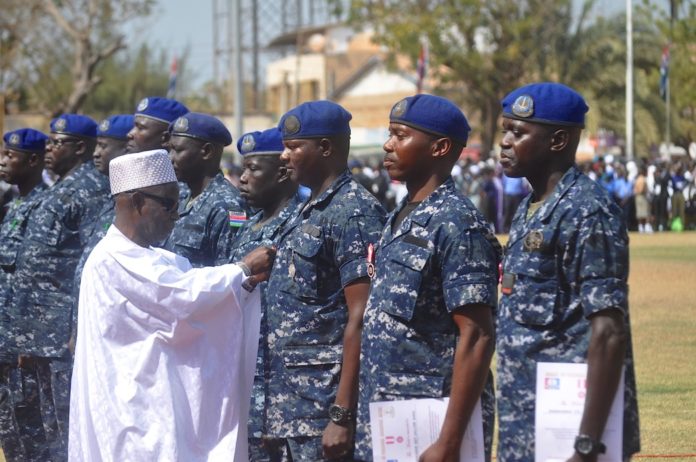By Momodou Jarju
Dozens of Security Officers, who played a lead role in thwarting The Gambia from getting into conflict during the political impasse, were yesterday decorated with medal of “personal sacrifice” by President Adama Barrow at the McCarthy Square in Banjul.
The awardees, 90 in number, some believed weren’t serving members of the army at the time, refused to align with former president Yahya Jammeh who refused to concede defeat after accepting the election results barely a week earlier, to protect President Barrow “before, during and after the political impasse that followed the 1st December 2016 elections.”
They are being recognised for contributing to successfully installing the democratically elected government of President Barrow at great risk to personal safety, security and position, according to a citation read by Army spokesperson Lieutenant Colonel Modou Lamin Sanyang.
These non-serving members of the army at the time, working with the ‘coalition security’ (group of civilians), offered security to President Barrow and his team and were recruited into the army when Barrow assumed power.
Prominent among the awardees were former Chief of Defence Staff Lieutenant General Ousman Badjie and his Deputy Chief of Defense Staff Major General Yankuba Drammeh, Lietenant General Masanneh Kinteh, the current CDS, formerly Gambian ambassador to Cuba, Mamat O Cham, the current army commander, Private Kaddy Sanneh and several others.
Meanwhile, delivering his speech of the 54th Independence anniversary of The Gambia, President Barrow said the national day avails Gambia the opportunity to talk about its successes, challenges and progress she registered since nationhood.
Barrow said Gambians have acknowledged that sovereignty should be matched by economic independence the capacity to generate resources and funds for investment and judicious spending.
“The underlying objective is for all citizens to engage in nation building as a united force. This is the environment that my government has now created for Gambians,” he said.
He urged Gambians to love their country and sacrifice in times of need and distress which requires rejecting all forms of socio-political discrimination and extremism disguised as nationalism.
“It is essential to develop a deep sense of belonging to our motherland, and commit ourselves to the ideals and values of the nation. We have proven that when we stand united in the cause of the nation, we can achieve a lot,” he said.
SUCCESSES REGISTERED
Barrow expressed his proudness of the successes he registered with ‘patriotic citizens’ friends and partners such as legislation, infrastructural development, transitional justice, institutional reform etc. as enshrined in his 2018-2021 NDP and the constitutional review and development process.
“Also, amongst the progress registered are the recently launched roads and bridges projects in the Upper River and North Bank Regions. Higher learning institutions, such as The Gambia College twin projects, and health infrastructures are being decentralised to promote inclusive development for all. Working with partners, the education sector is building modern classrooms in various parts of the country to make the learning environment more conducive and accessible. Inroads made within the water and energy sectors are also evident cases in point,” he said
Barrow shared his determination to bridge the country’s economic, political and social gaps across all communities.
Unfortunately, he went on, sabotage and destruction of water equipment reveal the extent to which subversive elements and enemies of the nation can go to undermine efforts and discredit his government.
“This calls for vigilance to ensure that vandals and saboteurs do not succeed in any way. In contrast, with much humility, I am touched by the immense support given to me and my government by individuals, organizations and friendly nations,” he added.
The Gambia, one of the smallest country within mainland Africa was declared independent from the British in 1965 pioneered by Edward Francis Small and attained its status under the leadership of first president Dawda Jawara. Jawara ruled the country for 30 years before second President Yahya Jammeh usurped his reign in a coup in 1994. Third President Adama Barrow assumed power in January 2017 in a surprise defeat in December 2016 election.




















